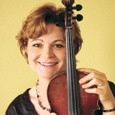
I graduated from a small, rural Wisconsin high school in 1988. The band program was not a top notch band, but it was an appreciated part of the district. When we marched halftime shows, the football players marched right along with us. Teaching methods, budgets and community attitudes have changed in small school districts over the years, however. As an adult I have taught music in the Cochrane-Fountain City School district for the past 16 years.
Unlike directors in large districts with multiple band and choir directors, I teach half of the elementary music classes as well as the entire band program, including beginning, junior high, senior high, and pep band. Last year I even taught a bluegrass band. Most students do not have a private teacher because it requires a 30-minute trip to a nearby town and an extra $15-$25 per lesson.
This is a small district with 342 students in grades K-6, and 297 students in grades 7-12. The typical grade size is 50 students. My three children attend school in this district, and I am proud of it. All students have opportunities to make sports teams or be cast in the yearly musical. They do not have to audition to make the top band.
The Problems
There is a big difference between teaching in large and small schools. There sometimes almost seems to be animosity between these teachers when they meet at state conventions and contests. When I have spoken with adjudicators at solo and ensemble contests, they describe the success of students from large schools, while those from small schools struggle with less difficult solos.
Often small districts faced with economic difficulties will resort to teacher cut backs. The remaining music teachers simply do not have the time and resources to work with individual students. In many districts you will find one teacher handling the teaching load for the entire district.
I have also found that the number of band students has decreased over the past few years for various reasons. Scheduling problems sometimes pit programs against each other. If students want to take the FFA field trip their senior year, for example, they must be enrolled in agriculture classes each year, and this conflicts with band. Other problems come from such required courses as foreign language and PE. We tried to solve this by scheduling band and choir at the same time. This hour was supposed to be reserved for music with no big courses offered then. Unfortunately that proved impossible, and we still lost students. We also found that there were students who wanted to participate in both programs and had to alternate between them. This hurts us, because the full band meets only about half the time. Students miss out on important information and are frustrated. In many cases they make the sad decision to choose one music course over the other.
Another problem is RTI (Response to Intervention) class time which takes place during 8th hour. Students who are having difficulties report to the class in which they have the worst grade. While 95% of the band students have at least a B+ average, top students can take AP courses during this period. This involves all of my students. I cannot take them out of class for lessons when they are in AP calculus. This has been a big change in recent years. In the 1980s, it was expected that students would leave class for private music lessons. Today, according to our board of education, lessons are reserved for beginners and are only given to groups of students. Any other lessons are supposed to be taught by private teachers outside the district. If I tried to teach private lessons, they would cut into my preparation time and would have to take place before or after school.
Solutions
Despite these difficulties, I have implemented some useful changes with the help of the school administration. Pep band attendance was often a problem as many music students are also involved with sports. My solution was to open pep band to junior high musicians. I select easier charts and fill seats. I also cannot grade students on attending pep band. According to our district that would mean we would have to send a bus to pick up students who do not have a ride to school. Instead I play the role of cheerleader and find or write music students want to rehearse. We came up with a great drum cadence a few years back that still makes the community sway and rock. For younger students who cannot handle the notes (flutes especially), I simplify the scores and fill in melodic gaps with simplified lines with as few notes and accidentals as possible. This takes more time, but students literally grow into the original, more challenging parts. Pep band improves their playing skills, and as I remind them, it gets them into the games with the bonus of a free hot dog and soda.
It is always a challenge to recruit band students as they move from general music to band or choir in fifth grade. This past year the superintendent, principal and I met to brainstorm ways to keep numbers up in pep and concert bands. Our superintendent, well aware of the economical challenges facing local parents, knew that to make this work the school would have to buy or rent instruments for these beginning band students. Every child would receive reeds, books, and music supplied by the district.
It was an amazing success. We had 55 students in beginning band last year, a big boost from previous years when parents had to rent instruments and purchase books and reeds. Recorder has been moved back to grades 3 and 4 to prepare students to move into band and choir in 5th and 6th grade. My beginning students feel an amazing sense of pride in their accomplishments. I started a new tradition at the end of each class. We play Taps and then all yell, “Band dismissed!” These children would otherwise not have been able to afford an instrument.
The administration is making another helpful change to require 7th grade students to participate in either band or choir. Next year they hope to expand the program to make 8th grade band or choir mandatory. Junior high is a key time when students often choose sports over music. Built-in music classes show students that they can enjoy band and choir as well as sports.
I have an undying faith that with the current change of course, the music programs in our district are growing, prospering, and filled with pride. It is a rebirth I am passionate about furthering. If that means altering scores for particular students or even composing music, I will do what it takes. Band is not just about learning an instrument, it creates pride for your school – as small as it is. Students from small schools are not blind. They see what the larger schools surrounding them can do and are intimidated far too often. They need to feel pride in their own achievements.
Music teachers in small districts should first communicate with school administrators and staff. Ask to meet to brainstorm about ways to make things work better. We took two general music classes (about 200 minutes per week) and converted them into a band/choir program. When we placed instruments into the hands of students, they took note reading lessons they had previously gotten only from books and put them to real use. So much can be accomplished when teachers and administrators come together rather than grumbling about a situation that seems unsalvageable.
Get in touch with parents and the community to understand their views of music education. Perhaps they see school music only in terms of a pep band or marching. When you know what they want, you will have a better grasp on what it may take to attain success.
Many teachers are so concerned about proving their merits to avoid the chopping block that they expend energy in unproductive ways and exhaust themselves. Spread the word about students’ achievements in the paper, school newsletters, and on stage. Make it clear that good things are happening in your department. Recognize your worth and make people aware of it.
Assess your situation and make time for yourself. If you do not have time to eat lunch – a situation I was in a few years back – it is your own fault. I had to take action to carve out time somehow. I spoke up to the administration and even to school board members. They are not your enemy and must be your allies.
Be good to yourself. Wear a smile as much as you can. Connect with others, and remember that you chose teaching as your passion. Renew that passion by making the changes needed to upgrade your small school’s music department.






